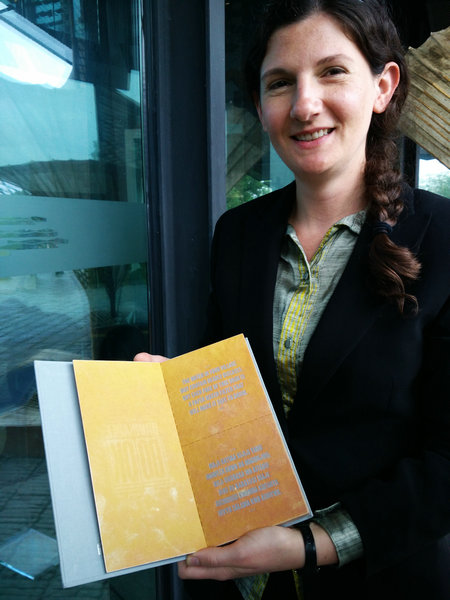Homing Fantasy
 |
|
Theresa Dankovich holds her "drinkable book", which won her the top prize at the same presentation.[Photo by Wang Kaihao/ China Daily] |
From water filters to chairs, China's top design awards celebrate unusual ideas. Wang Kaihao reports in Hangzhou.
US chemist Theresa Dankovich, who is in her 30s, won the top prize at the Design Intelligence Award 2016 on Sunday in Hangzhou, the capital of East China's Zhejiang province. Her entry called a "drinkable book" uses technologically advanced filter paper, which is said to be capable of killing deadly germs that cause cholera and typhoid. And there is information inked on the pages, which is mainly to remind people about water safety.
Speaking to China Daily about what prompted her to design the "book", she says: "Around 3.4 million people globally die each year from water-related diseases, but the even bigger problem is that most of them don't know that the water they are drinking is unsafe in the first place."
To use the "book", people have to pick out a filter-like page from it, slide it into a regular filter, and pour water through it for drinking.
"When I went to a village in Bangladesh and showed them my 'book', a woman was so determined to have it that she said, 'If my husband doesn't buy this for me, I will write poetry and sell it, so I can have this and my family will be healthy.' That's best quote I have," says Dankovich.
The award, launched by the Zhejiang local government and the Hangzhou-based China Academy of Art, which will be given annually, is said to be the world's richest industrial design award for now.
For Dankovich, the needs of local communities are more important than a fancy appearance when it comes to developing the product. "I have learned to listen and understand, and then deliver a design that fits the local lifestyle and culture, not to cater to the top end of the market."
Responding to a question from one of the judges that her "book" is too delicate to be of use in poverty-stricken areas, she says she expects future versions to use plastic casing instead of the current hard cover and thus make the filters renewable.
Her "book" is now being used in a pilot project in schools in Kenya and South Africa, and there are plans for it to be marketed there later this year at affordable prices, she says.
















